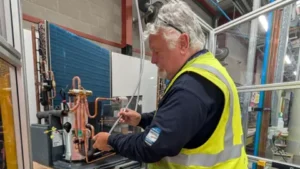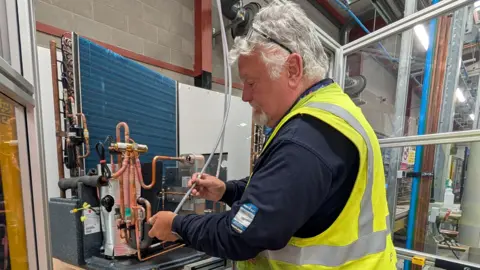The heating pump industry is on the cusp of significant change, driven by the imperative to tackle climate change and the increasing demand for energy-efficient appliances. As Chris Baraniuk reports, companies like Octopus Energy are gearing up to fulfill ambitious installation targets set by the UK government. Yet, the question remains: will consumers embrace this shift toward heat pumps, which operate on electricity rather than traditional fossil fuels like oil or gas?
In an enlightening visit to Octopus Energy’s manufacturing facility in Craigavon, Northern Ireland, it was evident that the factory is well-equipped to handle production demands, with a capacity to produce an impressive 600 heat pumps per month—a figure that is expected to double soon. The urgency of transitioning to renewable energy sources cannot be overstressed, as the UK faces soaring temperatures and an unstable climate that necessitates comprehensive decarbonization of energy systems. Interestingly, despite warming weather conditions in London, the factory team expressed relief at the cooler Northern Irish climate, highlighting a juxtaposition of the climate crisis in action.
Training for factory workers is thorough, with employees like Patrick Doran navigating various stages of the production process—from installing pipework to connecting complex electrical systems. As Doran enthusiastically explained, this variety keeps the work engaging and dynamic. Conversely, the installation of heat pumps across UK homes is lagging significantly behind government goals—600,000 annual installations by 2028, compared to a mere 100,000 installations in 2024.
The dynamics of heat pump demand have shifted post-pandemic. Following the spike in gas prices due to geopolitical tensions stemming from the Russian invasion of Ukraine in 2022, interest in heat pumps surged. However, with the recent reduction in gas prices, the competitive edge that heat pumps held has diminished, making them less appealing when it comes to operational costs. To combat this slowing momentum, Octopus Energy is adamant about introducing innovative technologies and streamlined product designs to enhance performance.
The head of commercial for Octopus, Aimee Clark, emphasized the importance of developing a “plug-and-play” solution that resonates with homeowners across the UK. Uniquely, Octopus is taking the approach of manufacturing its own heat pumps, which is somewhat unconventional for energy providers. This strategy highlights their commitment to quality and performance, enabling them to control production and integrate advances directly into their offerings.
In the broader UK and European landscape, other competitors, such as Vaillant and Copeland, are similarly enhancing their production capabilities. In crafting heat pumps, the technology is impressive; they effectively capture ambient heat through refrigerants, which then undergo a compression process to enhance their temperature before distributing that heat throughout a home’s heating systems.
From a design perspective, Octopus heat pumps feature distinct elements. Their dark grey casing may seem unremarkable, yet the internal design boasts patented technology that optimizes performance. The inclusion of internal metal plates and insulation beads plays a vital role in maximizing efficiency while minimizing energy losses. Though the fundamental technology behind heat pumps has been established since the 1800s, companies like Octopus strive to inject innovation into their products to distinguish themselves amidst growing competition.
While heat pumps promise significant advantages such as high coefficients of performance (COP), which denotes their energy efficiency, the importance of proper installation cannot be underestimated. Experts from the University of Warwick stress that poor installation could lead to disappointing efficiency rates, ranging from a COP of 2.5 to as high as 4, impacting consumers’ energy bills substantially.
As per Octopus’s customer feedback, many report that their heat pumps perform comparably, if not better, than traditional gas heating systems. However, the role of public confidence in adapting to this green technology remains integral to the future of heat pumps. Increased taxation on fossil fuels could incite greater interest in renewable heating solutions. Notably, Northern Ireland remains a particularly paradoxical region, having the highest proportion of oil heating systems yet lacking supportive financial incentives for transitioning to heat pumps.
Ultimately, the trajectory of the heat pump industry rests on multiple factors: its capacity for innovation, consumer acceptance, and supportive policies. As the urgency to address climate change intensifies, the moment is ripe for the market to embrace this eco-friendly revolution.











